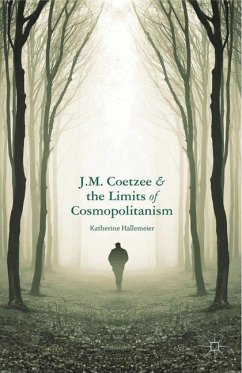Drawing on postcolonial and gender studies, as well as affect theory, the book interrogates cosmopolitan philosophies. Through analysis of J.M. Coetzee's later fiction, Hallemeier invites the re-imagining of cosmopolitanism, particularly as it is performed through the reading of literature.
"J. M. Coetzee and the Limits of Cosmopolitanism is remarkably accomplished, both as cultural philosophy and as literary criticism. With understated precision, Katherine Hallemeier gathers and critiques contemporary theories of cosmopolitanism, then puts them to the test in a series of discerning readings of J. M. Coetzee. In unpicking a few recent orthodoxies, she makes a refreshing contribution to Coetzee studies." - David Atwell, Professor of English, University of York, UK
"Fluid, salient and an original discussion of the affective politics of cosmopolitanism and the novels of J.M. Coetzee. Bringing together a rich range of historical and contemporary literatures on cosmopolitanism, emotion, and postcolonial fiction, Hallemeier's book moves beyond existing readings of Coetzee to argue incisively that his work provides the seeds of an alternative framework for cosmopolitanism that neither equates feeling with morality nor normalizes feelings as 'human.'" - CarolynPedwell, Senior Lecturer in Media and Cultural Studies, Newcastle University, UK, and author of Feminism, Culture and Embodied Practice: The Rhetorics of Comparison and Affective Relations: The Transnational Politics of Empathy
"Fluid, salient and an original discussion of the affective politics of cosmopolitanism and the novels of J.M. Coetzee. Bringing together a rich range of historical and contemporary literatures on cosmopolitanism, emotion, and postcolonial fiction, Hallemeier's book moves beyond existing readings of Coetzee to argue incisively that his work provides the seeds of an alternative framework for cosmopolitanism that neither equates feeling with morality nor normalizes feelings as 'human.'" - CarolynPedwell, Senior Lecturer in Media and Cultural Studies, Newcastle University, UK, and author of Feminism, Culture and Embodied Practice: The Rhetorics of Comparison and Affective Relations: The Transnational Politics of Empathy








